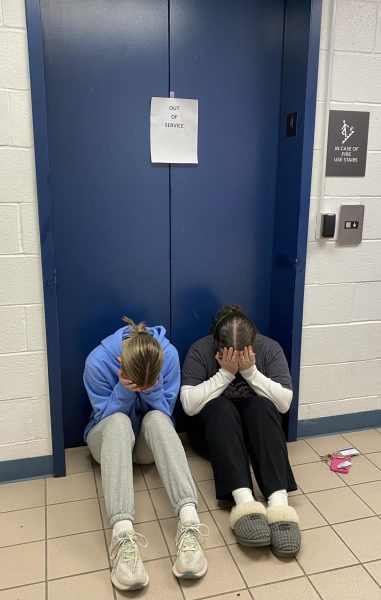 Students say campus is not as accessible as it should be for people with disabilities.
Students say campus is not as accessible as it should be for people with disabilities.
The elevator in Gildea Hall has been down, off and on, since move-in day. Residence halls elevators have not had a good track record, as they have been broken for periods in both Gildea Hall and McGowan/Alumnae Hall had been broken for significant periods of time last year.
The Gildea elevator broke during a crucial time when elevator access was necessary for students moving in over the weekend. Hauling heavy and bulky items up multiple flights of stairs is not ideal nor safe especially for those with family members who aren’t able to hike up multiple times.
Naeqwon Morris, a junior criminology major who lives on the 4th floor of Gildea, brought his 63-year-old grandfather who was only able to walk up the stairs once. Morris had help from other people to move in the rest of his belongings.
Abigail Conti, sophomore occupational therapy major, helped her friends with the heavy lifting.
“I did have to help my friends move-in the day that the elevator broke. We were sweating. It was crazy,” Conti said.
Some students are even spooked. Morris had gotten stuck in the elevator once last year, and once this year. “When I got stuck, I really panicked, and I called campus security and as soon as they were on the phone the elevator went from the 4th floor and shot all the way down to the basement,” Morris said.
Additionally, students say it’s a workout to walk up multiple flights of stairs when injured or holding heavy items. “It’s just another obstacle to get through like after a long day you come back to your nice cozy warm room and you have to climb the stairs to get there,” said Conti, a track athlete.
Injured students are also impacted. Morris injured his ankle and was on crutches and was forced to hobble and jump each step to get to his room on the 4th floor last year.
Kristen Ricardo, the Assistant Director of the Student Success Center and the Office of Students with Disabilities, was unaware of the Gildea elevator being down. Students suggest better communication throughout the campus when elevators are out of service.
A potential solution to this would be emailed MU Alerts similar to the alerts students, staff, and faculty receive regarding parking restrictions, upcoming events, and building closings, such as the Anderson Sports and Health Center.
“I think it would be a great idea to notify you guys, then us, and faculty. I specifically work with a lot of students, so if I see that alert I can start making adjustments” Ricardo said.
“It is important to have a working elevator in all buildings,” Ricardo added. “I work with students who have a specific need for the elevator, some use it for convenience, others use it because they need to.”
Riccardo said new Contruction projects may increase reliance on elevators and even door-opening buttons. According to a proposed master plan, the Office of Students with Disabilities will be on the 2nd floor of Mercy Hall, which has only one set of doors that doesn’t have stairs. Additionally, the elevator had broken down several times in recent years.
“Only having one elevator in the building is a challenge especially if it’s broken, especially because we are the Office of Disabilities,” said Ricardo.
Elevators are not the only thing that is not the most accessible for many residents. The doors at Banks Student Life Center are difficult to open when it’s windy, and the doors that are handicap accessible present other barriers. “The doors are really heavy. A lot of time if you push a button they don’t work. I often tell people don’t push the buttons because we want to save them for people who need them.” said Ricardo. It begs the question, is Misericordia really as accessible as it seems?
